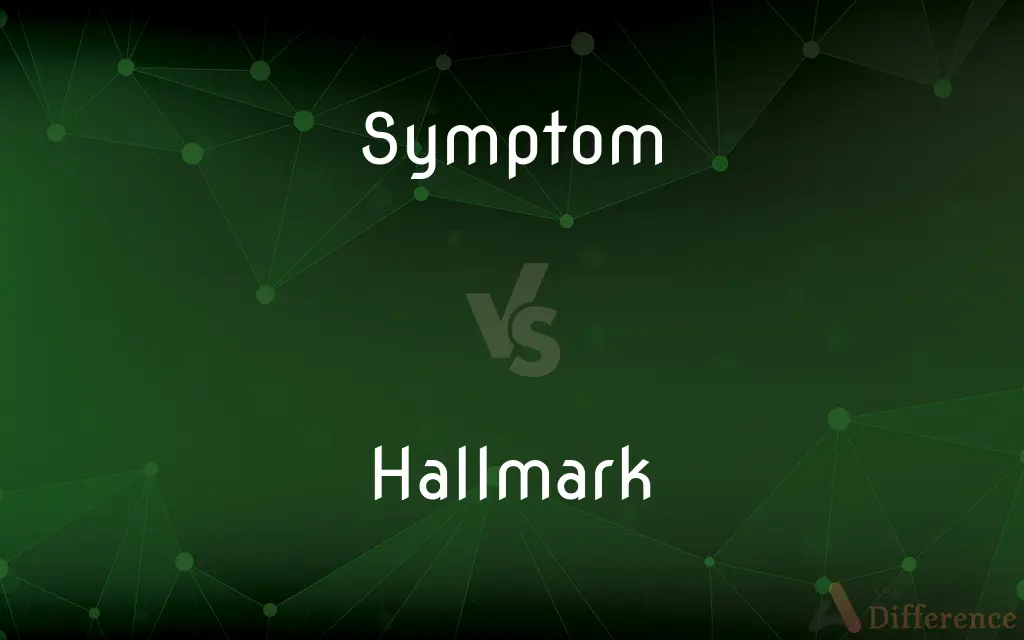Symptom vs. Hallmark — What's the Difference?
By Urooj Arif & Maham Liaqat — Updated on March 7, 2024
A symptom is a subjective indication of a disease experienced by the patient, while a hallmark is a distinctive characteristic or feature prominently indicating a condition.

Difference Between Symptom and Hallmark
Table of Contents
ADVERTISEMENT
Key Differences
Symptoms are subjective feelings of illness or discomfort reported by the individual experiencing them. These can include pain, fatigue, nausea, and other sensations that are not directly observable by others. On the other hand, hallmarks are objective, distinguishing features or phenomena that are indicative of a specific condition, disease, or quality, and can be observed or measured by external means.
While symptoms rely on a patient's personal experience and self-reporting, hallmarks can be universally recognized and quantified through diagnostic tests or observations. For instance, a patient might report symptoms of feeling feverish and weak, whereas a hallmark of an infection could be a measured fever confirmed by a thermometer.
Symptoms can vary greatly among individuals and sometimes may be ambiguous or mimic those of other conditions, making diagnosis based solely on symptoms challenging. In contrast, hallmarks are often specific and play a crucial role in identifying and distinguishing one disease from another, aiding in the accuracy of diagnoses.
The identification of symptoms is crucial for the initial assessment of a patient's condition and can guide healthcare professionals towards further testing to uncover any underlying hallmarks of a disease. Whereas, identifying hallmarks often involves specific tests or criteria that confirm the presence of a condition, providing a clear direction for treatment.
Symptoms and hallmarks together contribute to the diagnosis and understanding of medical conditions. While symptoms represent the subjective experience of the patient, hallmarks offer objective evidence that supports the identification and characterization of diseases or conditions.
ADVERTISEMENT
Comparison Chart
Nature
Subjective
Objective
Detection
Reported by patient
Identified through tests/observations
Role in Diagnosis
Initiates investigation
Confirms diagnosis
Variability
Can vary widely among individuals
More consistent and specific
Example
Feeling nauseous
Elevated white blood cell count
Compare with Definitions
Symptom
A physical or mental feature indicating a condition.
Symptoms of dehydration include thirst and dry mouth.
Hallmark
A sign used to identify the quality or purity.
Silver items often bear a hallmark to certify their purity.
Symptom
Manifestations of an underlying disease or condition.
Symptoms such as coughing and fever may indicate a viral infection.
Hallmark
An attribute or feature that is emblematic of something.
Originality is a hallmark of true artists.
Symptom
An indication of something undesirable.
The economic downturn showed symptoms of a larger financial crisis.
Hallmark
A feature indicating the presence of a condition.
The hallmark of a good leader is effective communication.
Symptom
A characteristic sign or indication of the existence of something.
The symptom of her anxiety was increased heart rate.
Hallmark
A distinguishing characteristic of a disease.
A hallmark of diabetes is elevated blood sugar levels.
Symptom
A sign of disease or disorder experienced by an individual.
He reported symptoms of dizziness and fatigue.
Hallmark
A distinctive trait or feature.
Efficiency and reliability are hallmarks of their service.
Symptom
An indication of a disorder or disease, especially a subjective one such as pain, nausea, or weakness.
Hallmark
A hallmark is an official mark or series of marks struck on items made of metal, mostly to certify the content of noble metals—such as platinum, gold, silver and in some nations, palladium. In a more general sense, the term hallmark can also be used to refer to any distinguishing mark.
Symptom
A characteristic sign or indication of the existence of something else
Drought and erratic rainfall as symptoms of climate change.
Hallmark
A mark stamped on articles of gold, silver, or platinum by the British assay offices, certifying their standard of purity.
Symptom
(medicine) A perceived change in some function, sensation or appearance of a person that indicates a disease or disorder, such as fever, headache or rash; strictly, a symptom is felt or experienced by the patient, while a sign can be detected by an observer.
Swollen breasts, morning sickness, and a missed period are classic symptoms of pregnancy.
Hallmark
Stamp with a hallmark
He was reprimanded for not hallmarking his work
Symptom
(figuratively) A signal; anything that indicates, or is characteristic of, the presence of something else, especially of something undesirable.
Lying, hiding one's true feelings, and having affairs are typical symptoms of a doomed marriage.
Hallmark
A mark indicating quality or excellence.
Symptom
Any affection which accompanies disease; a perceptible change in the body or its functions, which indicates disease, or the kind or phases of disease; as, the causes of disease often lie beyond our sight, but we learn their nature by the symptoms exhibited.
Like the sick man, we are expiring with all sorts of good symptoms.
Hallmark
A mark used in Great Britain to stamp gold, silver, and platinum articles that meet established standards of purity.
Symptom
A sign or token; that which indicates the existence of something else; as, corruption in elections is a symptom of the decay of public virtue.
Hallmark
Any of various authorized marks stamped on gold, silver, and platinum articles to indicate where, when, or by whom they were made or assayed.
Symptom
(medicine) any sensation or change in bodily function that is experienced by a patient and is associated with a particular disease
Hallmark
A conspicuous feature or characteristic
"The sense of guilt is the hallmark of civilized humanity" (Theodor Reik).
Symptom
Anything that accompanies X and is regarded as an indication of X's existence
Hallmark
To stamp (gold and silver articles) with a mark indicating purity.
Hallmark
To be a conspicuous feature or characteristic of
A legislature hallmarked by inefficiencies.
Hallmark
A distinguishing characteristic.
Hallmark
An official marking made by a trusted party, usually an assay office, on items made of precious metals.
Hallmark
To provide or stamp with a hallmark.
Hallmark
A distinctive characteristic or attribute
Hallmark
A mark on an article of trade to indicate its origin and authenticity
Common Curiosities
Why are hallmarks important in diagnosis?
Hallmarks are crucial for diagnosis because they provide objective evidence that can confirm the presence of a condition.
What is a symptom?
A symptom is a subjective indication of disease or disorder experienced by an individual.
How do symptoms and hallmarks differ in detection?
Symptoms are reported by the patient based on personal experience, whereas hallmarks are identified through objective tests or observations.
What is a hallmark?
A hallmark is a distinctive characteristic or feature prominently indicating a specific condition or quality.
What role do symptoms play in patient care?
Symptoms play a critical role in initiating the process of diagnosis and treatment by alerting individuals and healthcare providers to potential health issues.
Are symptoms always related to diseases?
While often related to diseases, symptoms can also arise from non-disease conditions such as stress or injury.
Can a symptom be a hallmark?
Generally, symptoms are subjective and cannot be a hallmark, which is objective and quantifiable.
Can the same symptom appear in different diseases?
Yes, the same symptom can appear in various diseases, making differential diagnosis important.
How do hallmarks assist in the treatment of diseases?
Hallmarks assist in treatment by confirming the specific disease or condition, allowing for targeted therapy.
How can symptoms guide healthcare professionals?
Symptoms guide healthcare professionals by indicating potential issues that may require further investigation to identify any underlying hallmarks.
Why is it challenging to diagnose based solely on symptoms?
Diagnosing solely on symptoms is challenging due to their subjective nature and the fact that many symptoms overlap among different conditions.
What is the significance of recognizing early symptoms?
Recognizing early symptoms is significant as it can lead to earlier diagnosis and treatment, potentially improving outcomes.
Can hallmarks change over time?
Some hallmarks can change as a disease progresses or in response to treatment, which is why ongoing assessment is important.
How do symptoms affect daily life?
Symptoms can significantly affect daily life by impacting an individual's ability to perform tasks, their comfort, and overall well-being.
Is it possible to have a condition without showing any symptoms?
Yes, it's possible to have a condition without symptoms, especially in early stages or if the condition is asymptomatic.
Share Your Discovery

Previous Comparison
Diameter vs. Perimeter
Next Comparison
Lecithin vs. CephalinAuthor Spotlight
Written by
Urooj ArifUrooj is a skilled content writer at Ask Difference, known for her exceptional ability to simplify complex topics into engaging and informative content. With a passion for research and a flair for clear, concise writing, she consistently delivers articles that resonate with our diverse audience.
Co-written by
Maham Liaqat














































